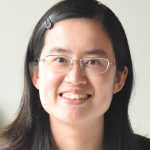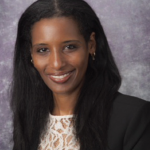 Lin Shen, MD, PhD
Lin Shen, MD, PhD
Instructor, Department of Medicine, Division of Rheumatology, University of California–San Francisco (UCSF)
Background: Dr. Shen became interested in rheumatology while earning her medical degree in her native China. She received her PhD in pharmacology at Johns Hopkins, focusing on the pharmacodynamics of human immunodeficiency virus medications. She trained at the University of Pittsburgh Medical Center, recently finished her rheumatology fellowship at UCSF and now works in Dr. Arthur Weiss’s research lab.
“I’m intrigued by the systemic and comprehensive nature of autoimmune diseases,” she says. “I love the emphasis on the individual patient, the personalized treatment strategy and developing a long-term relationship with patients.”
During fellowship, she created a mouse model carrying the ZAP-70 mutation using clustered regularly interspaced short palindromic repeats (CRISPR) technology. Her goal: to better understand how the mutation affects T cell receptor signaling, T cell development and autoimmunity. The fast pace of rheumatology research is “exciting, intriguing and challenging,” she says. “I look forward to bringing new perspectives to the pathogenesis and therapeutics of autoimmune diseases through a better understanding of the basic immunology underlying these diseases,” she adds.
‘I’m intrigued by the systemic & comprehensive nature of autoimmune diseases.’ —Dr. Shen
Q: Last year you won a Scientist Development Award from the Rheumatology Research Foundation. What does it mean to be recognized this year by the ACR?
A: It’s an incredible honor. It encourages me to continue my research effort … to better understand the pathogenesis of rheumatic diseases.
Q: What do you see as the value of mentoring?
A: My mentors opened the doors of science and medicine to me. I wouldn’t be where I am today without my mentors. My mentors are my role models. They’ve shown me how to do great science, practice great medicine and, most importantly, what kind of mentor I would like to become in the future—to pass on the passion for science, medicine and teaching to the next generations to attract more wonderful young people to rheumatology.
Q: Where do you want to be in 10 years?
A: I aspire to be a physician-scientist in rheumatology who transforms clinical observations into testable research hypotheses, understands disease pathogenesis at a fundamental level and translates research findings into medical advances. My long-term goal: to establish an independent laboratory dedicated to the pathogenesis and, potentially, the therapy of autoimmune diseases, using both mouse models and patient samples.
 Mehret Birru Talabi, MD, PhD
Mehret Birru Talabi, MD, PhD
Assistant professor, Rheumatology and Clinical Immunology, University of Pittsburgh



